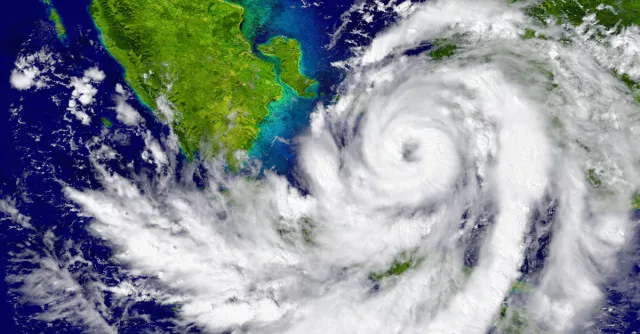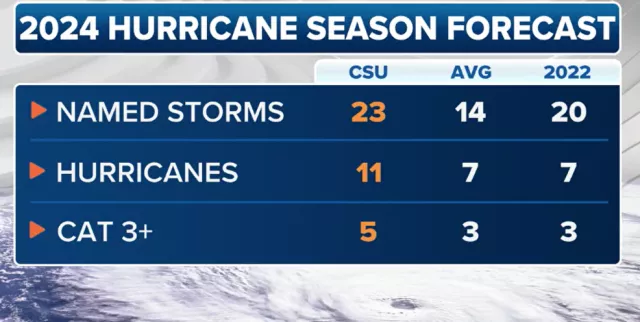Navigating Disaster Recovery and Business Continuity During the 2024 Hurricane Season

In this blog post, we will explore the predictions for the 2024 Atlantic hurricane season by region, understand the impact of hurricanes on businesses, develop a plan for disaster recovery and business continuity strategies, implement effective response and recovery systems, and use technology to facilitate disaster management and mitigation. By following these steps, businesses can be better equipped to handle any unexpected crises related to the 2024 hurricane season.
Predictions for the 2024 Atlantic Hurricane Season
As the 2024 hurricane season approaches, it is important to understand how climate change could affect the intensity and frequency of storms in the Atlantic region. It's been reported that warmer than average surface water temperatures, record-setting in fact, are on track to produce one of the most active hurricane seasons of all time. NOAA, The CSU Tropical Meteorology Project team, and AccuWeather are predicting an "extremely active" hurricane season, with AccuWeather going so far as to call the upcoming season "explosive" and potentially record-breaking. With an estimated 23 named storms, 11 are predicted to become hurricanes, with 5 reaching major hurricane strength (Category 3 or higher). This means that businesses must prepare for any potential disasters that may occur.
No matter the predictions, there are steps businesses can take to minimize their risks and prepare accordingly. For example, companies should review their insurance plans and make sure they have adequate coverage for any potential disasters. They should also consider investing in emergency supplies such as backup generators or fuel cell batteries in case of power outages. Additionally, businesses should put together a disaster recovery plan that outlines how they will respond if a storm hits their area and what actions to take afterward to get back up and running quickly.
Finally, businesses should stay informed about the latest weather forecasts throughout the entire hurricane season by using reliable sources such as the National Hurricane Center or local news outlets for up-to-date information on storm activity and warnings in specific regions. Staying informed can help ensure that you're always one step ahead when it comes to protecting your business from potential disasters during the 2024 Atlantic hurricane season.
Understanding the Impact of Hurricanes on Businesses
As the 2024 Atlantic hurricane season approaches, it is important for businesses to understand the potential impact of hurricanes on their operations. Hurricanes can cause significant damage to property and disrupt day-to-day operations, resulting in a substantial financial loss. Businesses should take steps to prepare for natural disasters to minimize losses and maximize recovery.
Financial costs associated with natural disasters such as hurricanes can be difficult to estimate due to the wide range of variables that must be considered. The cost of repairs or replacement of damaged property, lost revenue due to business interruption, and additional expenses associated with relocating personnel are all factors that must be considered when estimating financial losses caused by a hurricane. Additionally, businesses must also factor in the cost of insurance premiums, which will likely increase after a major storm event.
In addition to the financial costs associated with natural disasters, businesses should also take steps to identify their critical assets and protect them from potential damage caused by a hurricane. This includes physical assets such as buildings and equipment, as well as digital assets such as data and systems. Businesses should create contingency plans that outline how they will protect these assets before, during, and after a hurricane event. Furthermore, businesses should also consider how they will respond in case of human resource disruptions due to employees being unable or unwilling to work during an emergency situation.
Businesses affected by hurricanes may be eligible for disaster relief funding from government sources such as FEMA (Federal Emergency Management Agency). It is important for companies looking for disaster relief assistance to thoroughly research available options before applying so that they can best maximize their funds through grants or loans available through government programs. Finally, businesses should also consider ways in which they can protect their brand reputation in the event of a hurricane-related event; this includes proactive communication strategies both during and after any storms throughout the 2024 hurricane season.
Overall, it is important for businesses operating within regions prone to hurricanes during the upcoming season to understand the potential risks posed by hurricanes and how those risks can affect their operations if not properly managed ahead of time. By taking necessary steps such as reviewing insurance plans, investing in emergency supplies, creating a plan for disaster recovery and business continuity strategies, and implementing effective response and recovery systems using technology where possible, companies will stand a better chance at surviving any potential disasters that may occur during this year’s hurricane season
Developing a Plan for Disaster Recovery and Business Continuity Strategies
Preparing for hurricane season is an essential part of protecting businesses from potential damage. Organizations must begin by understanding the risks posed by hurricanes and assessing their level of exposure. This enables them to identify which systems and processes are most critical to protect, as well as develop strategies for responding to disasters. Following this, a comprehensive business continuity plan should be created that outlines all necessary preparations and actions in case of an emergency. To ensure readiness, regular testing and drills should be incorporated into the plan so employees are familiar with any protocols that need to be utilized during an event. By taking these steps, businesses have a better chance of surviving any destructive storms that may occur during the season.
Implementing Effective Response and Recovery Systems
As the 2024 hurricane season approaches, businesses must be ready to respond effectively in case of disaster. To achieve this goal, organizations should first identify the most crucial areas and processes that need to be prioritized. This may include communication systems, transportation networks, financial institutions, and supply chains. Afterward, companies should develop strategies for emergency communication and coordination as well as procedures for managing crises like evacuations. Additionally, it is important to ensure compliance with all applicable regulations concerning disasters.
Furthermore, steps should be taken to secure critical data from potential power outages or other disruptions caused by natural disasters like hurricanes. Strategies such as comprehensive backups of all important files and cloud-based storage solutions are key components of any effective data protection system. Companies should also create policies outlining how their employees are expected to protect sensitive data during times of crisis.
By having a strong response and recovery plan in place before the start of the 2024 hurricane season, businesses can minimize downtime and disruption if a disaster strikes. A well-thought-out system will enable companies to continue operations despite any challenges posed by Mother Nature over the coming months.
Using Technology to Facilitate Disaster Management and Mitigation
In today's world, technology has become an essential part of disaster management and mitigation. From automated systems to cloud computing, businesses can use a variety of tools to better prepare for and respond to storms or other disasters. Automated systems provide real-time monitoring of weather conditions, while cloud computing ensures that important data is accessible from multiple locations. Predictive analytics offer insights into potential disasters, allowing companies to plan ahead before it’s too late. Bi-directional emergency notification systems with multiple forms of communication are also useful for staying in touch with employees and customers during times of emergency. Remote access solutions like VPNs or virtual desktops allow businesses to maintain access even if their physical premises become unusable due to a storm or flood. With the help of these technologies, organizations can work together toward a more resilient future in the face of natural disasters.
Is your organization prepared for whatever this hurricane season may bring? Reach out to us today for a free demo to see how Preparis can help.



